|
|
|
446th Bomb Group USAAF
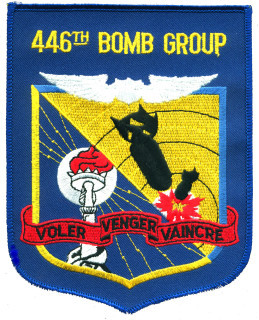
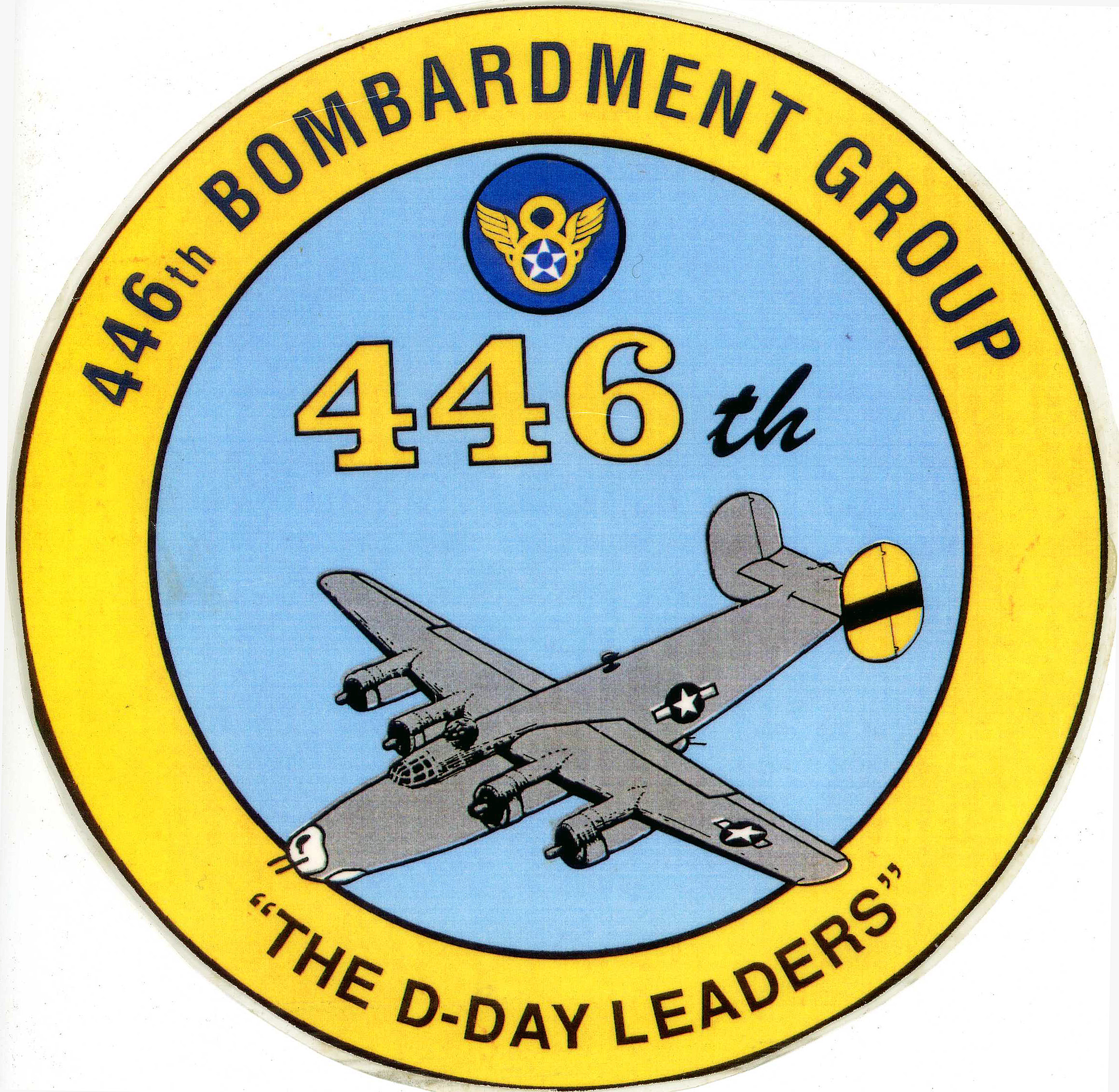
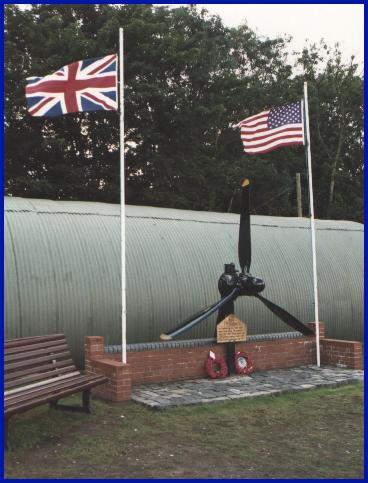 |
The 446th B.G. Memorial at Flixton
This memorial (above) is dedicated to the memory of the 456 airmen
killed in action and to those serving at Flixton from
1943 - 1945, unveiled by Bill Davenport, President of
the 446th. Bomb Group Association in 1993 during a Group
reunion. It comprises a three blade Hamilton Standard
propeller, of the type used by Liberators. It features
a superb cast bronze plaque featuring a Liberator and
Eighth Air Force badge which reads:
"To the memory of all those who gave
their lives or served with the 446th Bomb Group based at
Flixton, Bungay, 1943 - 1945. 20th Combat Wing, 2nd Air
Division".
Images of all memorials at the museum, on the
airfield and in the grounds of St Mary's Church can be
found here.
|
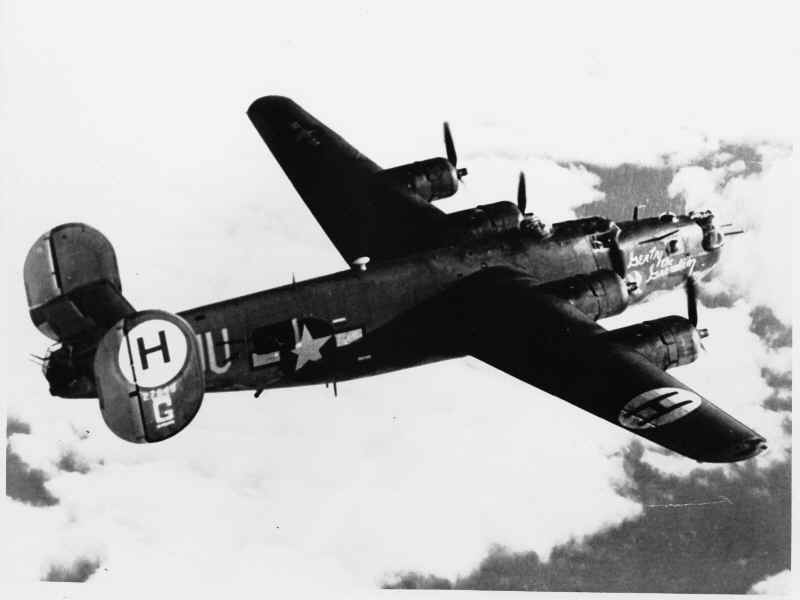
B24H. 42-7649 JU-G Gerty the Gremlin
of 707 Squadron. |
"Gerty the Gremlin" (pictured left) was one of the
Liberators flown from Flixton by 707 Bombardment
Squadron. past President of the 446th B.G. Association,
Frank Bigos, was navigator on this aircraft for most of
his missions. She was declared war-weary in January
1945 after 70 missions.
|
|
The 446th Bombardment Group (Heavy) was activated on
1st April 1943 at Davis-Monthan Field, Tucson, Arizona.
The Group trained at Lowry Field, Denver, Colorado for
overseas duty with B-24 Liberators and departed for
European Theatre of Operations on October 18th 1943,
setting up a permanent base at Station 125, Flixton, in
November 1943. The 446th began operations on 16th
December 1943 with a raid against Bremen, and flew the
last against Salzburg on April 25th 1945. The Group
flew a total of 273 missions between those dates, and
during that time, they lost 58 aircraft, with 447 men
being killed in action. The 446th destroyed 34 enemy
aircraft, with 11 probable and 8 damaged, and dropped a
total bomb weight of 16,818.95 tons. Over 6000
personnel served at Flixton between November 1943 and
August 1945. In this, the year 2002, there are over
1100 members of 446th B.G. Association who hold reunions
each year and receive the Quarterly Newsletter "The
Beachbell Echo".
Typical of the many acts of heroism performed
by 446 BG pilots was that of 2nd Lt Cecil T Miller of
the 704th Bomb Sqn on 24 February 1944. His crippled
B-24H 42-7574 was returning from Gotha with a badly
holed port wing. The crew, with the exception of the
pilot, co-pilot and navigator, baled out over Flixton.
These three headed for the emergency runway at RAF
Woodbridge, but whilst circling the airfield all four
engines cut due to lack of fuel. Miller ordered the
other two to jump, and veered the B-24 away from
barracks before it crashed at Hill Farm, Sternfield.
Miller died in the crash and was subsequently
posthumously awarded the Silver Star.
On 27th April 1944, the increased hours of
daylight allowed the Group to fly two missions. B-24H
42-50306 had just cleared the runway when the wind
suddenly veered and the pilots lost control. The
aircraft crashed near Abbey Farm, Flixton; the bomb load
exploded soon afterwards killing the crew of 10.
The Group took part in "Big Week" - the concerted
attacks on the German aircraft industry - in late
February 1944. One mission was to the Me. 110 plant at
Gotha on 24 February when the Bungay group got off
lightly with two losses out of a total of 33 sustained
by the 2nd Bomb Division. The mission to the Hamm
marshalling yards on 22nd April 1944, was postponed
until late in the day and caused the 2nd Division groups
to return at dusk with navigation lights on. A surprise
follow-up by Ju. 88s and Me. 410s of KG 51, which hit
the Waveney Valley groups during their let-down for
landing, caused chaos in the area. 13 Liberators of the
division crashed or crash landed as a result of these
intruder's actions and our own anti- aircraft guns which
were shooting wildly in the panic. Although Flixton
airfield was attacked, no known losses were sustained -
the worst hit being Seething where 3 B-24s piled into
each other on the runway and two were shot down just
before reaching their base.
|
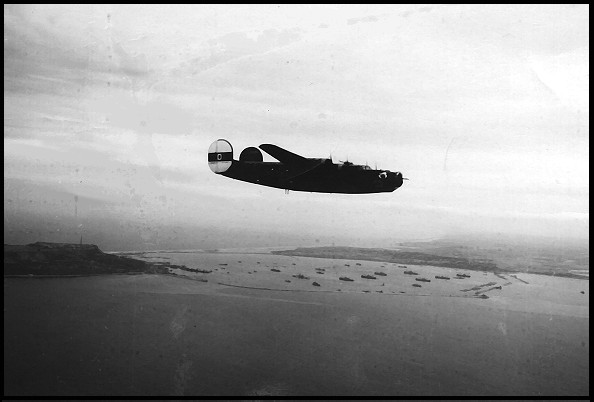
Photo supplied by Scott Hilliard,
446BG.
B24-H. 41-29125 JU-D Tar Heel Baby, over Portsmouth,
D-Day plus 6. |
Under field order 328, Bungay’s 446th Group had the
distinction of leading the 8th Air Force on the first
mission of D-Day, 6th June 1944. Colonel Brogger in "Red
Ass" was first to take off at 0200 hours and, following
a lengthy assembly, led the formations to hit the
Normandy beach defences at H-hour minus 5 (five to six)
on that fateful day. This was the first of four missions
flown that day by the 20th Combat Wing in support of the
landings, and the following weeks saw the 446th employed
in mainly tactical missions until the land forces were
firmly established in France. Then it was back to the
strategic grind with a number of "Crossbow" (V-weapons)
targets included. Commencing at the end of August 1944,
the group was employed occasionally on "trucking"
operations - flying in much-needed supplies to France,
and on 18th September, took part in the very low-level
supply drops in Holland in support of the airborne
forces at Nijmegen. During this mission the group lost 3
B-24s, and 25 of the 36 taking part were damaged.
Colonel Brogger was wounded on this trip and
subsequently decorated with the Silver Star. Command of
the 446th then passed to Colonel TW Crawford who
remained CO until 4th April 1945.
|
|
The first B-24 to complete 100 missions in the 8th
Air Force is believed to be "Ronnie" (41-29144), of the
704th Bomb Sqn, while the 706th and 707th were credited
with over 60 consecutive missions without loss. The
Group’s tail markings were an ‘H’ in a circle and the
assembly ship's, "Fearless Freddie" was painted yellow
over all, and later "Fearless Freddie II" was painted
orange. Probably the most tragic accident of all
occurred on the 13th April 1945, as the 446th BG
returned from an attack on Regensberg. Two B-24s,
42-50790 "Litte King II" and 42-51909, a PFF aircraft,
collided in mid-air while circling the base, crashing at
Mendham near Homersfield with a loss of 21 lives. The
446th Group’s last raid was flown on 25th April 1945, by
which time they had clocked up 273 combat missions
during which they delivered 16,800 tons of bombs. Total
losses amounted to 58 aircraft in action, and 28 due to
other operational causes.
|
Campaign Ribbons
European-African-Middle Eastern Theater
Bronze Star ETO ribbon
Normandy Campaign
Northern France Campaign
Ardennes-Alsace
Rhineland
Central Europe
Southern France
|
The
446th B.G. comprised
704,
705, 706 and 707 Bombardment Squadrons.
with
the following support
Squadrons and Groups;
Detachment "A" 1248th MP Company (Avn)
460th
Sub-Depot Class 1
588th
Army Postal Unit
2967th
Finance Detachment
212th
Finance Section
2035th
Engineer Aviation Fire Fighting Platoon
12114
QM Co. Service Group Avn (RS)
Detachment
"A" 885th Chemical Co.
1821st
Ordnance Supply and Maintenance Co. Avn.
25th
Station Complement Squadron (SP)
260th
Medical Dispensary Avn. (RS)
378th
Air Service Group
Group
HQ and HQ Squadron
815th
Air Engineering Squadron
639th
Material Squadron
|
Publications
Books
available relating the history of the
446th Bombardment Group include;
The
History of 446th B.G. (1946)
Ed Castens
The
446th Revisited (1998)
Ed Castens
The
History of 446th B.G. (1989)
Harold E Jansen
|
Recommended
Links
446th
bomb group association official web site.
2nd
air division library.
446th Airlift Wing
|
The pages below contain images from our
archives
We apologise but due to the limited number of
volunteers it has not been possible to apply accessibility
captions to these photographs.
|
|
Photographs taken during 446BG missions
|
|
|
Examples of Nose art on 446 BG aircraft
|
|
|
Photographs from the Albert Krassman collection
|
|
|
Photographs taken around Flixton, home of 446BG
|
|
|
Photographs of personnel taken during WW2
|
|
|
Photographs of personnel and their families taken
after the war
|
|
|
Sample documents from during WW2
|
|
|
Details of aircraft operated by the squadrons
|
|
|
|
|
|
|
|
|
|

